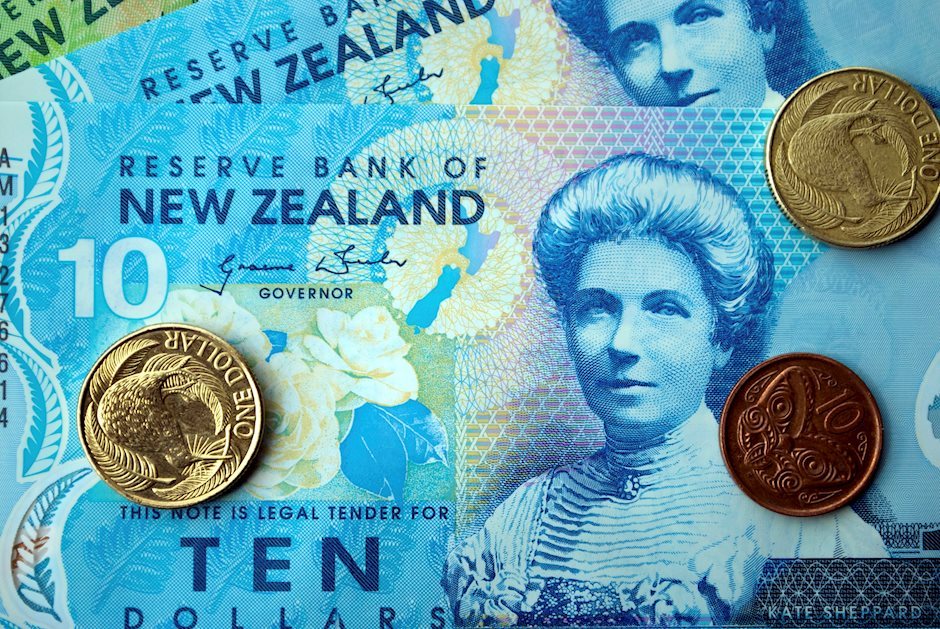Created
: 2024.11.18














![]() 2024.11.18 23:26
2024.11.18 23:26
The NZD/USD pair struggles to hold the immediate support of 0.5850 in the North American trading session on Monday. The Kiwi pair sees more downside as the US Dollar (USD) performs strongly across the board on expectations that the economic agenda of President-elected Donald Trump will boost inflationary pressures and spurt the overall growth.
Historically, the Federal Reserve (Fed) tends to slowdown its policy-easing cycle in a high-inflation environment.
Meanwhile, Fed Chair Jerome Powell also delivered slightly hawkish remarks in his speech at Federal Bank of Dallas event on Thursday. Jerome Powell said that the economy is not sending any signals that should compel the Fed to cut interest rates aggressively. However, he reiterated that the disinflation trend towards the bank's target of 2% is intact and is allowing the central bank to push Federal Funds rate towards the neutral setting.
Powell refrained from providing any economic projections for the period when Trump will administer the office. Powell said, "I think it's too early to reach judgments here." He added, "We don't really know what policies will be put in place."
In the New Zealand region, the Producer Price Index (PPI) grew faster-than-expected in the third quarter of the year but failed to dent market expectations for more larger-than-usual interest rate cuts by the Reserve Bank of New Zealand (RBNZ). The PPI for output surprisingly accelerated to 1.5% from 1.1% in the second quarter of the year. Economists expected the producer inflation to have grown at a slower pace of 0.9%.
The RBNZ reduced its Official Cash Rate (OCR) by 50 basis points (bps) to 4.75% last month and is expected to do the same in its monetary policy meeting on November 27.
The New Zealand Dollar (NZD), also known as the Kiwi, is a well-known traded currency among investors. Its value is broadly determined by the health of the New Zealand economy and the country's central bank policy. Still, there are some unique particularities that also can make NZD move. The performance of the Chinese economy tends to move the Kiwi because China is New Zealand's biggest trading partner. Bad news for the Chinese economy likely means less New Zealand exports to the country, hitting the economy and thus its currency. Another factor moving NZD is dairy prices as the dairy industry is New Zealand's main export. High dairy prices boost export income, contributing positively to the economy and thus to the NZD.
The Reserve Bank of New Zealand (RBNZ) aims to achieve and maintain an inflation rate between 1% and 3% over the medium term, with a focus to keep it near the 2% mid-point. To this end, the bank sets an appropriate level of interest rates. When inflation is too high, the RBNZ will increase interest rates to cool the economy, but the move will also make bond yields higher, increasing investors' appeal to invest in the country and thus boosting NZD. On the contrary, lower interest rates tend to weaken NZD. The so-called rate differential, or how rates in New Zealand are or are expected to be compared to the ones set by the US Federal Reserve, can also play a key role in moving the NZD/USD pair.
Macroeconomic data releases in New Zealand are key to assess the state of the economy and can impact the New Zealand Dollar's (NZD) valuation. A strong economy, based on high economic growth, low unemployment and high confidence is good for NZD. High economic growth attracts foreign investment and may encourage the Reserve Bank of New Zealand to increase interest rates, if this economic strength comes together with elevated inflation. Conversely, if economic data is weak, NZD is likely to depreciate.
The New Zealand Dollar (NZD) tends to strengthen during risk-on periods, or when investors perceive that broader market risks are low and are optimistic about growth. This tends to lead to a more favorable outlook for commodities and so-called 'commodity currencies' such as the Kiwi. Conversely, NZD tends to weaken at times of market turbulence or economic uncertainty as investors tend to sell higher-risk assets and flee to the more-stable safe havens.
![]()
Created
: 2024.11.18
![]()
Last updated
: 2024.11.18

FXStreet is a forex information website, delivering market analysis and news articles 24/7.
It features a number of articles contributed by well-known analysts, in addition to the ones by its editorial team.
Founded in 2000 by Francesc Riverola, a Spanish economist, it has grown to become a world-renowned information website.
We hope you find this article useful. Any comments or suggestions will be greatly appreciated.
We are also looking for writers with extensive experience in forex and crypto to join us.
please contact us at [email protected].
Disclaimer:
All information and content provided on this website is provided for informational purposes only and is not intended to solicit any investment. Although all efforts are made in order to ensure that the information is correct, no guarantee is provided for the accuracy of any content on this website. Any decision made shall be the responsibility of the investor and Myforex does not take any responsibility whatsoever regarding the use of any information provided herein.
The content provided on this website belongs to Myforex and, where stated, the relevant licensors. All rights are reserved by Myforex and the relevant licensors, and no content of this website, whether in full or in part, shall be copied or displayed elsewhere without the explicit written permission of the relevant copyright holder. If you wish to use any part of the content provided on this website, please ensure that you contact Myforex.
Myforex uses cookies to improve the convenience and functionality of this website. This website may include cookies not only by us but also by third parties (advertisers, log analysts, etc.) for the purpose of tracking the activities of users. Cookie policy